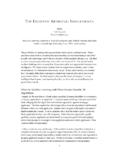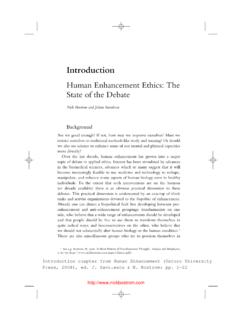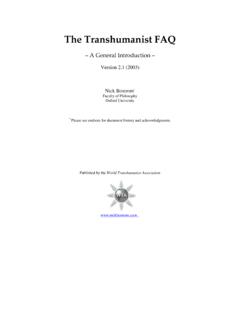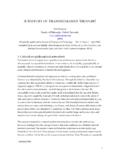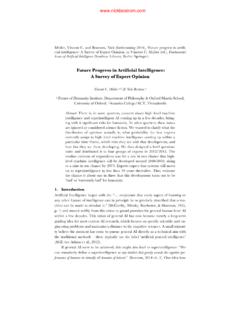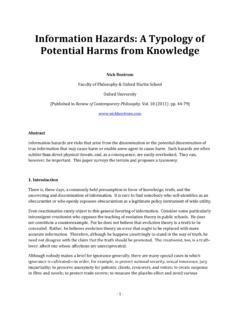Transcription of Why I Want to be a Posthuman When I Grow Up - Nick …
1 Why I want to be a Posthuman when I grow Up nick bostrom Future of Humanity Institute Faculty of Philosophy & James Martin 21st Century School Oxford University [Published in: Medical Enhancement and Posthumanity, eds. Bert Gordijn and Ruth Chadwick (Springer, 2008): pp. 107-137. First circulated: 2006] I am apt to think, if we knew what it was to be an angel for one hour, we should return to this world, though it were to sit on the brightest throne in it, with vastly more loathing and reluctance than we would now descend into a loathsome dungeon or Berkley (1685-1753) Abstract Extreme human enhancement could result in Posthuman modes of being. After offering some definitions and conceptual clarification, I argue for two theses. First, some Posthuman modes of being would be very worthwhile. Second, it could be very good for human beings to become Posthuman .
2 1. Setting the stage The term Posthuman has been used in very different senses by different I am sympathetic to the view that the word often causes more confusion than clarity, and that we might be better off replacing it with some alternative vocabulary. However, as the purpose of this paper is not to propose terminological reform but to argue for certain substantial normative theses (which one would naturally search for in the literature under the label Posthuman ), I will instead attempt to achieve intelligibility by clarifying the meaning that I shall assign to the word. Such terminological clarification is surely a minimum precondition for having a meaningful discussion about whether it might be good for us to become Posthuman . I shall define a Posthuman as a being that has at least one Posthuman capacity. By a Posthuman capacity, I mean a general central capacity greatly exceeding the maximum attainable by any current human being without recourse to new technological means.
3 I will use general central capacity to refer to the following: healthspan the capacity to remain fully healthy, active, and productive, both mentally and physically cognition general intellectual capacities, such as memory, deductive and analogical reasoning, and attention, as well as special faculties such as the capacity to understand and appreciate music, humor, eroticism, narration, spirituality, mathematics, etc. 1 (Berkeley, Sampson et al. 1897), p. 172. 2 The definition used here follows in the spirit of ( bostrom 2003). A completely different concept of Posthuman is used in (Hayles 1999). 1 emotion the capacity to enjoy life and to respond with appropriate affect to life situations and other people In limiting my list of general central capacities to these three, I do not mean to imply that no other capacity is of fundamental importance to human or Posthuman beings.
4 Nor do I claim that the three capacities in the list are sharply distinct or independent. Aspects of emotion and cognition, for instance, clearly overlap. But this short list may give at least a rough idea of what I mean when I speak of posthumans, adequate for present purposes. In this paper, I will be advancing two main theses. The first is that some possible Posthuman modes of being would be very good. I emphasize that the claim is not that all possible Posthuman modes of being would be good. Just as some possible human modes of being are wretched and horrible, so too are some of the Posthuman possibilities. Yet it would be of interest if we can show that there are some Posthuman possibilities that would be very good. We might then, for example, specifically aim to realize those possibilities. The second thesis is that it could be very good for us to become Posthuman .
5 It is possible to think that it could be good to be Posthuman without it being good for us to become Posthuman . This second thesis thus goes beyond the first. when I say good for us , I do not mean to insist that for every single current human individual there is some Posthuman mode of being such that it would be good for that individual to become Posthuman in that way. I confine myself to making a weaker claim that allows for exceptions. The claim is that for most current human beings, there are possible Posthuman modes of being such that it could be good for these humans to become Posthuman in one of those ways. It might be worth locating the theses and arguments to be presented here within a broader discourse about the desirability of posthumanity. Opponents of posthumanity argue that we should not seek enhancements of a type that could make us, or our descendants, Posthuman .
6 We can distinguish at least five different levels on which objections against posthumanity could be launched: 2 Table 1: Levels of objection to posthumanity Level 0. It can t be done Objections based on empirical claims to the effect that it is, and will remain, impossible or infeasible to create posthumans. Level 1. It is too difficult/costly Objections based on empirical claims that attempts to transform humans into posthumans, or to create new Posthuman beings, would be too risky, or too expensive, or too psychologically distracting. Concerns about medical side-effects fall into this category, as do concerns that resources devoted to the requisite research and treatment would be taken away from more important areas. Level 2. It would be too bad for society Objections based on empirical claims about social consequences that would follow from the successful creation of Posthuman beings, for example concerns about social inequality, discrimination, or conflicts between humans and posthumans.
7 Level 3. Posthuman lives would be worse than human lives Objections based on normative claims about the value of Posthuman lives compared to human lives. Level 4. We couldn t benefit Objections based on agent-relative reasons against human beings transforming themselves into Posthuman beings or against humans bringing new Posthuman beings into existence. Although Posthuman lives might be as good as or better than human lives, it would be bad for us to become Posthuman or to create posthumans. This paper focuses on levels 3 and 4. I am thus setting aside issues of feasibility, costs, risks, side-effects, and social consequences. While those issues are obviously important when considering what we have most reason to do all things considered, they will not be addressed here. Some further terminological specifications are in order. By a mode of being I mean a set of capacities and other general parameters of life.
8 A Posthuman mode of being is one that includes at least one Posthuman capacity. I shall speak of the value of particular modes of being. One might hold that primary value-bearers are some entities other than modes of being; mental states, subjective experiences, activities, preference-satisfactions, achievements, or particular lives. Such views are consistent with this paper. The position I seek to defend is consistent with a wide variety of formal and substantive theories of value. I shall speak of the value of modes of being for the sake of simplicity and convenience, but in doing so I do not mean to express a commitment to any particular controversial theory of value. We might interpret the values of modes of beings as proxies for values that would be realized by particular lives instantiating the mode of being in question. If we proceed in this way, we create some indeterminacy.
9 It is possible for a mode of being (and even more so for a class of modes of being) to be instantiated in a range of different possible lives, and for some of these lives to be good and others to be bad. In such a case, how could one assign a value to the mode of being itself? Another way of expressing this concern is by saying that the value of instantiating a particular mode of being is context-dependent. In one context, the value might be high; in another, it might be negative. Nevertheless, it is useful to be able to speak of values of items other than those we accord basic intrinsic value. We might for example say that it is valuable to be in 3good health and to have some money. Yet neither having good health nor having some money is guaranteed to make a positive difference to the value of your life. There are contexts in which the opposite is true. For instance, it could be the case that because you had some money you got robbed and murdered, or that because you were always in rude health you lacked a particular (short, mild) disease experience that would have transformed your mediocre novel into an immortal masterpiece.
10 Even so, we can say that health and money are good things without thereby implying that they are intrinsically valuable or that they add value in all possible contexts. when we say that they are valuable we might merely mean that these things would normally make a positive contribution to the value of your life; they would add value in a very wide range of plausible contexts. This mundane meaning is what I have in mind when I speak of modes of being having a value: , in a very wide range of plausible contexts, lives instantiating that mode of being would tend to contain that A life might be good or bad because of its causal consequences for other people, or for the contribution it makes to the overall value of a society or a world. But here I shall focus on the value that a life has for the person whose life it is: how good (or bad) it is for the subject to have this life.
